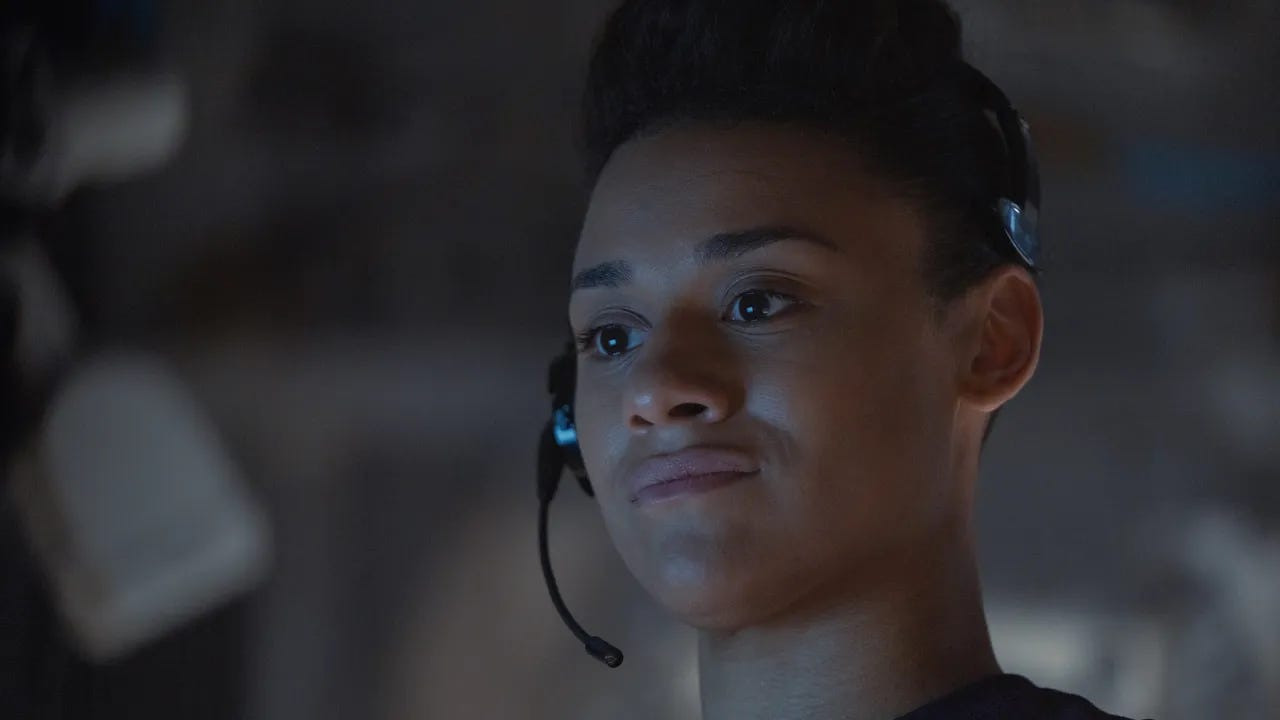In Review: 'Origin,' 'I.S.S.'
Two disappointing new movies explore global tensions from vastly different vantage points.
Origin
Dir. Ava DuVernay
135 min.
There isn’t a movie in Origin. Or, at least, there isn’t a movie that writer-director Ava DuVernay has the creative moxie to conjure from an unadaptable book. The source here is Isabel Wilkerson’s Caste: The Origins of Our Discontents, a nonfiction bestseller that pieces together a grand unifying theory of societal oppression. That’s an argument built around a thesis, not unlike DuVernay’s persuasive documentary The 13th, which draws on powerful archival footage to make the connection between slavery and a prison-industrial complex that punishes Black people disproportionately. Yet fiction features don’t accommodate that sort of didacticism. They have to persuade through drama, or a little cinematic brio.
What DuVernay has done instead is make a film about Wilkerson researching the book amid a rough patch in her personal life, which is every bit as uninspired and banal as it sounds. Following Wilkerson around the globe as she connects the dots between American racism, the Holocaust and the lowest rung of the Indian caste system, DuVernay reduces an audacious conceit to an intellectual Eat Pray Love, a therapeutic library tour. She was not required to deconstruct the pitfalls of adapting-the-unadaptable, as Charlie Kaufman did when The Orchid Thief got twisted into Adaptation. But her solution is to deny those pitfalls exist at all.
Origin starts, inauspiciously, with a re-creation of the Trayvon Martin killing in 2012, which leaves Wilkerson (Aunjanue Ellis-Taylor) with a vexing question: What could explain a Latino man, George Zimmerman, murdering a Black teenager in ostensible defense of a white community? To her, racism seems like an inadequate explanation, and so she starts to look elsewhere for a more fitting model of human oppression. In the meantime, the pillars of her own life are starting to crumble, with her mother (Emily Yancy) transitioning to a nursing home, her cousin (Niecy Nash-Betts) falling ill, and her husband (Jon Bernthal) dying suddenly in their bedroom.
DuVernay tries to suggest how Wilkerson’s personal drama informed her emotional state in writing the book, like her marriage to a white man or a contrived scene where she tries to connect with a plumber (Nick Offerman) wearing a Make America Great Again hat. But most of Origin ventures out into the wider world, as Wilkerson notes the parallels between American slavery and the Holocaust to a skeptical dinner host or enlists an Indian intellectual to tell her more about B.R. Ambedkar, a man born into the lowest, “untouchable” caste (Dalit) who challenged a brutal hierarchy. Other sources for the book, like a study of Deep South segregation conducted by a mixed-race team of scholars in ‘40s Mississippi or the story of a German who refused to give the Nazi salute in a 1936 photograph, are broadly dramatized.
There are a small handful of moments when DuVernay whips up the sort of connect-the-dots montage that made The 13th so effective, like a sequence where a Martin Luther King speech on “untouchables” plays over footage of contemporary New Delhi. But Origin more often tells when it should show, to the point where DuVernay surrenders completely and lets a museum exhibit do the talking. It’s perhaps most successful as an exhaustive trailer for the book, which sounds terrific. After watching Wilkerson in this film, viewers will know the way to the library. — Scott Tobias
Origin opens in select theaters this week.
I.S.S.
Dir. Gabriela Cowpethwaite
95 min.
When Dr. Kira Foster (Ariana DeBose) arrives at the International Space System early in I.S.S., she comes accompanied by high-minded ideals about the ways science can overcome international distrust and a clutch of mice for her experiments. Little does she realize that the latter will turn into a metaphor for her naivete about the former. It’s Kira’s first trip to the station, whose crew of six is evenly divided between Russians and Americans, and her first night there she gets an amazing view of the Earth from space and a crash course in life aboard the station, where everyone gets along and no one talks about politics. But all that changes when she witnesses what first appear to be volcanoes on the surface of the planet, only to soon realize she’s witnessing the first volleys in a nuclear war between the rival superpowers.
Prior to this, the Americans and Russians have been congenial companions, particularly when the vodka flows freely. And we’ll eventually learn that two—the American Gordon (Chris Messina) and the Russian Weronika (Masha Mashkova)—have become more than colleagues. But undercurrents of tension are present even before war breaks out, most notably when Gordon goofs on the end-of-the-Cold War Scorpions hit “Winds of Change” and his Russian counterpart Alexey (Pilou Asbæk) takes offense, noting it reminds him of the “end of a bad life.” Also, in the bad omen department, the mice do not get along.
Directed by Gabriela Cowpethwaite (Blackfish) from a script by Nick Shafir, I.S.S. sets up an intriguing first act, with Twilight Zone-worthy premise that the rest of the film can’t see all the way through. Instead of building tension after Gordon receives the order to claim the I.S.S. for America, whatever this takes, and assumes the Russians have received the same order, the film hardly waits a moment before letting one side make the first aggressive move. Twists follow, but none feel particularly meaningful and, apart from a novel setting, I.S.S. has little to recommend it beyond a short running time, some strong performances and a couple of low-gravity fight scenes. Any explosiveness, dramatic or otherwise, remains confined to the planet below. —Keith Phipps
I.S.S. opens in theaters tonight.









Gotta be honest, DuVernay has yet to make a movie that has clicked with me. Selma was a trite, bland biopic elevated to slightly above mediocre by David Oyelowo's performance, 13th felt like the most expensively produced college thesis project in existence, and the less said about A Wrinkle in Time, the better. So, Origin seems like a pretty safe skip.
I hadn't even heard of I.S.S. and that one also seems to be a stinker.
Wow, my partner and I just came home from seeing ORIGIN, and I have to say I found it involving, challenging, moving, and mostly successful. It *did* remind me of ADAPTATION, in that it stepped outside the source material as a way of addressing its core unadaptability. In this case, it means following the author as she wends her way into her book’s complex thesis -- oversimplified here, but I still found it thrilling to watch a film that was so surefooted about putting across an intellectual argument. Maybe there were about two historical recreations too many, but I found the Trayvon Martin scene, playing out to a soundtrack of the actual 911 calls, harrowing and very effective. This is not a conventional movie drama, and I found I didn’t need a “story” to keep me engaged. Ava DuVernay took and big swing here, and for me it connected.